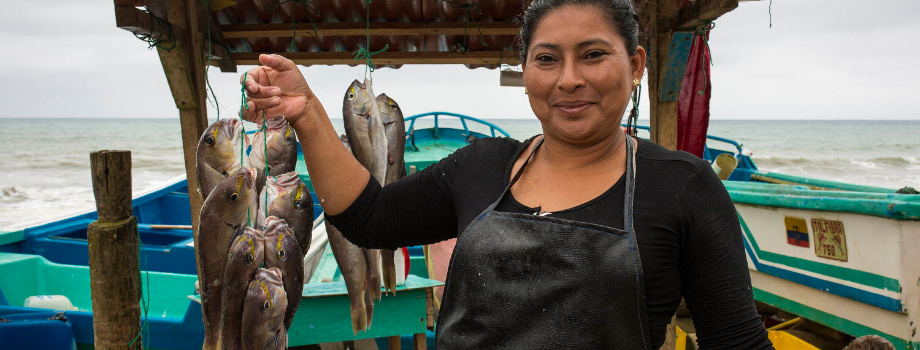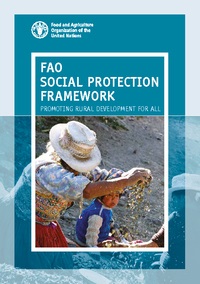
What is social protection?
Social protection is a set of interventions whose objective is to reduce social and economic risk and vulnerability, and to alleviate extreme poverty and deprivation (FAO, 2017). Across regions, evidence shows clear positive impacts of social protection programs in terms of food security, nutrition and human capital development (FAO, 2015). Social protection initiatives have been regarded as enhancing the economic and productive capacity of even the poorest and most marginalized communities, and therefore, should be a crucial part of a wider rural development agenda. Evidence shows that social protection helps agricultural smallholders to overcome the market and institutional failures hindering their development. In addition, when these interventions are shock-responsive, they contribute to disaster risk reduction and management (DRR/M) as well as to climate change adaptation and mitigation (CCA/M) initiatives and other covariate shocks. Coherence between natural resource management and social protection programmes, can also result in sustainable fisheries management and poverty reduction.
Social protection relies on three types of programmes in order to achieve the above and protect, prevent, promote and transform the livelihoods of the poor and vulnerable:
1. Social Assistance: offering cash and in-kind transfers and services to support and enable the poor;
2. Social Security: contributory programmes that protect people from the potential financial losses linked to lifecycle-related events (pregnancy, old age), livelihood risks (unemployment, illness) or shocks (e.g. hurricanes, floods, economic crises);
3. Labour Market Interventions: protective measures for the working age population, which aim to enhance employment opportunities, improve skills of workers and offer livelihood support.
Project Objectives
The SocPro4Fish project will be developed across regions building on ongoing work conducted by FAO in partnership with national governments to generate evidence based on social protection in the fisheries and aquaculture sector. Evidence generation is key to expand geographically social protection instruments for fishers, fish-farmers and fish-workers. The project will also seek to promote policies that institutionalize social protection and address the different needs of men and women in fisheries and aquaculture.
Initially, the project will conduct work in Colombia, Paraguay and Tunisia, but this seeks to have a catalytic effect in other countries across regions as evidence is generated and lessons learned on the benefits for poverty reduction, resilience building and natural resource management through social protection mechanisms and gender-responsive interventions.
The project aims to promote the economic inclusion and to strengthen the resilience and livelihood security of fishers and fish workers to cope with macro and micro level covariate impacts and shocks by increasing the understanding of the current scenario, reducing the barriers to access social protection (universal and sector-based), and promoting economic opportunities and better management of resources, by establishing synergies with other sectors, in selected countries.
This expected impact will be achieved through one main outcome with four outputs, focusing on strengthening institutional capacities for implementation, harmonizing and monitoring of policies, strategies and programmes at national and district levels.
Outcome 4: Institutional capacities increased for making available, implementing and monitoring social protection programmes, including shock-responsive and gender sensitive social protection for fishers, fish-workers and fish-farmers
- Output 4.1: Evidence-based policy support provided through assessing the enabling frameworks between social protection and fisheries policies and programmes and the vulnerability, hazards and the impacts of sample covariate shocks at the national and district level.
- Output 4.2: Technical tools developed to enhance fishers’ capacity to respond to covariate shocks caused by climate, health, socio-economic and environment disasters affecting fishing livelihoods.
- Output 4.3: Strengthened informal social protection providers and mechanisms to increase resilience of fishing households against covariate shocks.
- Output 4.4: South-South and Triangular Cooperation and dissemination of results to share lessons learned on scaling-up of social protection programmes to respond to covariate shocks in the fisheries sector.
What does the project do?
The SocPro4Fish project has identified specific opportunities for potential or ongoing processes on social protection in the fisheries and aquaculture sector. Through partnerships with governments, the project seems to work across continents, in Colombia, Paraguay and Tunisia.
In these countries, the project will implement the following activities:
- 4.1.1: Conduct legislative, policy and institutional studies and assessments on gender- sensitive social protection for fishers, fish workers and fish farmers.
- 4.1.2: Conduct a vulnerability and hazard analysis of small-scale fishers, fish-workers and fish-farmers, and an evaluation of the socio-economic impact of COVID-19 pandemic on small-scale fisheries and the social protection responses and gaps, collecting sex- and age-disaggregated data.
- 4.1.3: Conduct feasibility analysis of fish and fish-products within public procurement processes.
- 4.1.4: Conduct a global assessment of social protection schemes in the fisheries sector and compliance with the social protection mechanisms stipulated under International Labour Organization (ILO)’s convention 188 and the ILO’s recommendation 202 related to social protection floors.
- 4.1.5: Promote high-level dialogue amongst the Ministries of Fisheries, Ministries of Social Protection, Ministries of Environment, Ministries of Climate Change and/or other relevant Ministries.
- 4.2.1: Develop country level roadmaps to design and implement social protection mechanisms, in coherence with fisheries policies and programmes.
- 4.2.2: Support the expansion of national social protection systems.
- 4.3.1: Design a scale-up strategy for the revolving funds schemes in aquaculture communities.
- 4.3.2: Capacity development of community organizations to implement revolving funds schemes in aquaculture communities with particular attention to women and youth.
- 4.4.1: Exchange on experience and policy sharing in scaling-up social protection schemes.
- 4.4.2: Dissemination of lessons learned through a communication strategy.

